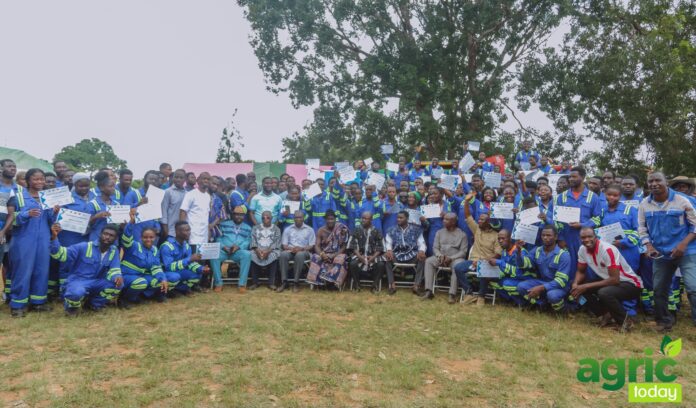World Food Programme, through the Food Systems, in collaboration with the Mastercard Foundation is embarking on a transformative initiative aimed at strengthening Ghana’s food systems with the goal of promoting increased value chains and generating employment opportunities specifically for the youth.
Over a projected period of five years, this program is designed to support 100,000 smallholder farmers while significantly reducing post-harvest losses and improving the income of these farmers.
This ambitious project was underscored during a graduation ceremony held at Ohawu Agric College on September 20, 2024.
The event celebrated the achievements of approximately 165 beneficiaries who graduated a six-week training program on Agricultural Engineering.
Speaking to Agric Today at the graduation ceremony, Stephen Odarteifio, the Food Systems Coordinator of WFP, Ghana, emphasized the importance of building the capacity of young people to guarantee economic freedom and sustainability.
He highlighted the striking contrast in practical skills acquired through targeted training compared to traditional university education.
“The skills you have acquired to manage agricultural equipment supersede those who have gone to university for four years,” Odarteifio noted.
He expressed his surprise at the disparity in practical training, stating, “it still baffles me as to how you can go through four years of university education, spending about 3,000 Ghana cedis on tuition every year and close to 10,000 Ghana cedis on food, yet not know how to operate a tractor.”
His comments shed light on the urgent need to reevaluate agricultural education in the country.
Odarteifio drew a comparison between medical professionals and agricultural engineers “a Medical Doctor who has studied medicine for about six years can operate on a human being, yet an agricultural engineer undergoes a similar length of study without the practical skills to operate essential machinery.”
He asserted that agricultural engineers are among the most underserved and underprivileged groups within Ghana’s workforce.
Recognizing the importance of practical skills, Odarteifio announced an investment initiative stating, “over the next two years, WFP Ghana, through the Food Systems Unit in collaboration with the Mastercard Foundation, will invest $100,000 in every agricultural colleges in this country.”
This investment aims to enhance the infrastructure and resources available for training future agricultural professionals, ensuring they are well-equipped to tackle the challenges facing the sector.
Sitsofe Nutsukpui, the Director of Finance and Programs of the Chamber of Agribusiness Ghana reinforced the significance of the graduation ceremony.
He described it as a moment to celebrate not only the beneficiaries but the advancement of the agricultural sector as a whole.
“This ceremony marks not only the culmination of hard work and dedication but also the beginning of a new opportunities in the field of post-harvest mechanization,” he noted.
Nutsukpui articulated the Chamber’s mandate in fostering growth in the agribusiness sector, which is essential for creating substantial job opportunities for Ghanaian youth.
He acknowledged that post-harvest losses continue to pose significant challenges within the agricultural sector and the broader economy. By equipping the beneficiaries with the necessary skills and mechanization, the program addresses critical issues related to food security and livelihoods in Ghana.
Nutsukpui further shared that approximately 60% of the beneficiaries have already secured placements across fourteen regions within various agribusiness enterprises, marking a promising start to their careers.
In an interview with Agric Today Media, Ambrose Entsiwah Jnr., the Volta Regional Director of the National Service Authority commended the graduates for their achievements and underscored the value of training programs that provide practical experience alongside theoretical knowledge.
“Such training programs give the opportunity to experience the practical aspect of the theories,” he stated.
Entsiwah highlighted the necessity for beneficiaries to engage in a one-year mandatory National Service, positioning it as a means of mobilizing young people into the workforce effectively.
He reiterated the program’s objective of reducing post-harvest losses, urging graduates to enter the workforce with enthusiasm and a commitment to driving change in the agricultural sector.








